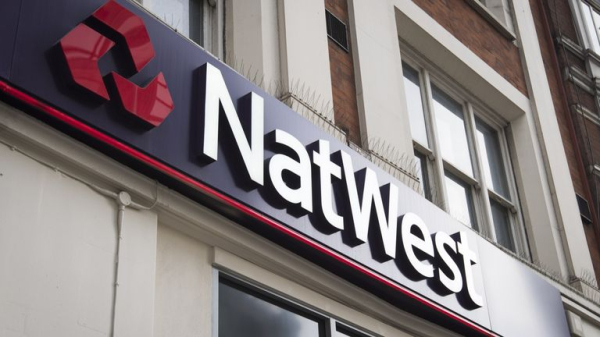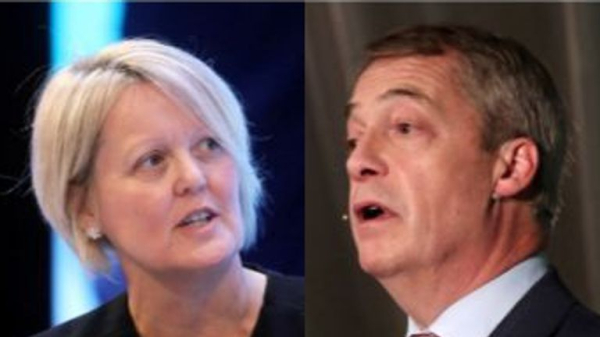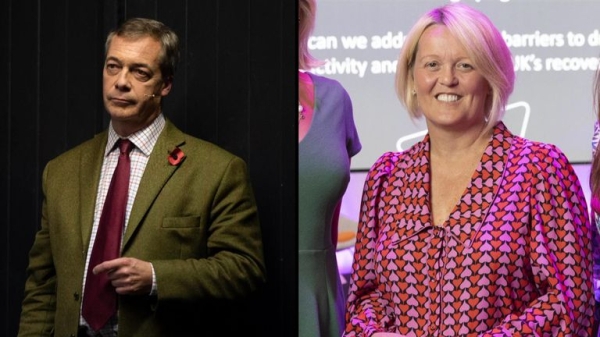NatWest profits surge as bank reels from Nigel Farage de-banking debacle

NatWest has reported a better-than-expected surge in half-year profits as the taxpayer-backed lender reels from the Nigel Farage de-banking debacle.
At the end of a week in which its chief executive Dame Alison Rose was forced to quit for her own role in the row, the bank revealed £3.6bn in pre-tax profits – up from the £2.6bn achieved in the same period last year as its bottom line was boosted by rising interest rates.
It made a further provision of more than £220m for bad loans in the tough economy but said it was currently seeing a low level of arrears and defaults due to higher mortgage and other borrowing costs.
NatWest updated on its progress following two days of hits to its share price, resulting in £1bn of market value being lost – a reaction to its leadership being left in tatters over the Farage fallout.
Dame Alison was forced out after admitting she had been the source of an inaccurate story in the media over the reason why the Brexit politician’s account with Coutts, a division of NatWest, had been closed down.
Coutts chief executive Peter Flavel followed her out of the door on Thursday.
Mr Farage has demanded the resignation of the entire group board, including chairman Sir Howard Davies, who had initially backed Dame Alison’s position before an apparent change of heart amid government anger.
Lenders have since been dragged into the Treasury, with regulators also applying pressure on the sector to ensure that anyone has access to banking regardless of their political views or perceived beliefs.
The row has overshadowed the banking results season with NatWest’s figures for the first half of 2023, like rivals Lloyds and Barclays so far, showing the benefits of rising interest rates as the Bank of England continues its campaign against inflation.
Financial analysts had expected profits closer to £3.3bn for the period for the bank, which announced an interim dividend of 5.5p per share and a share buyback of up to £500m for the current second half of the year.
The net interest margin – a key indicator for financial analysts that shows the spread between what the bank charges borrowers and pays to depositors – stood at 3.2%.

That was up from the 2.6% achieved in the same period a year ago but was lower in the second quarter – mirroring Lloyds – as banks came under political pressure to pass on better rates to savers.
Sky’s business presenter Ian King said Dame Alison’s stewardship of the bank’s financial performance was evident in the figures – especially in its growth of market share for mortgages.
“This really is a bank that was doing very, very well indeed under Alison Rose, ” he said.
She is set to be officially replaced, on an interim basis, by Paul Thwaite who had headed the group’s commercial and institutional banking division.

Chief financial officer, Katie Murray, said of the results: “NatWest Group’s strong performance for the first half of the year is underpinned by our robust balance sheet, with a high-quality deposit base, high levels of liquidity and a well-diversified loan book.
“As a result, we are able to continue lending to our customers and delivering sustainable returns and distributions to our shareholders, even in the current uncertain economic environment.”
Although arrears remain low, we know that people, families and businesses are anxious about their finances and many are really struggling.
“We are being proactive in our support for those who are hardest hit, helping to build the financial resilience of the
customers and communities we serve.”
Shares, down 10% over the year to date ahead of Friday’s open, were down fractionally in early trading as analysts pointed to disappointment that the net interest margin was not higher.
Matt Britzman, equity analyst at Hargreaves Lansdown, added: “Perhaps more importantly, full-year guidance has been dragged lower reflecting the ongoing deposit shift to accounts that offer better rates as consumers do all they can to make cash savings go further.”
